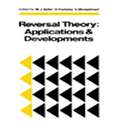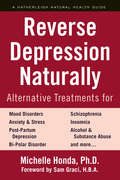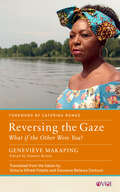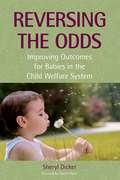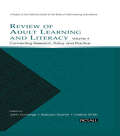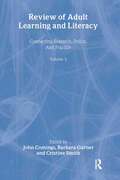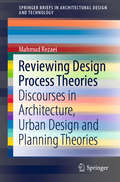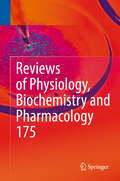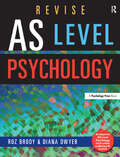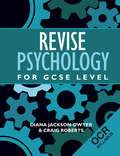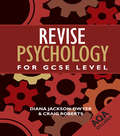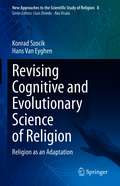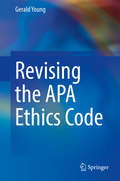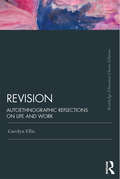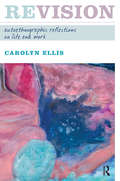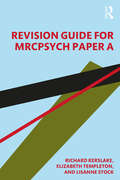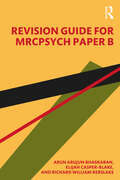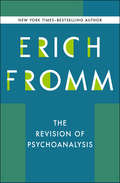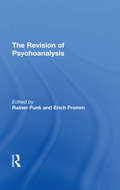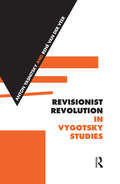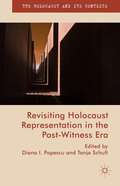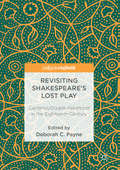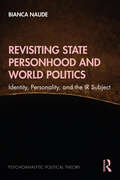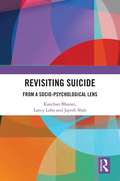- Table View
- List View
Reversal Theory: Applications and Development
by M. J. APTER, D. FONTANA and S. MURGATROYDFirst published in 1985. Routledge is an imprint of Taylor & Francis, an informa company.
Reverse Depression Naturally: Alternative Treatments for Mood Disorders, Anxiety and Stress
by Michelle HondaOffering breakthrough and effective holistic methods to manage and reduce depression and anxiety naturally from a leading naturopathic doctor.Globally, more than 300 million people of all ages suffer from depression and that number is only increasing. Reverse Depression Naturally provides a comprehensive overview of depression and anxiety and how to effectively and naturally manage them. It's a complete resource of healing remedies, dietary recommendations, mental exercises, and protocols. Reverse Depression Naturally offers practical tips and alternative solutions to popular treatments as well as beneficial supplements and home remedies. The book also features sections on stress, mental illness, alcoholism, and post-partum depression.
Reversing the Gaze: What if the Other Were You? (Other Voices of Italy)
by Geneviève MakapingTired of being scrutinized, criticized, and fetishized for her black skin, Cameroon-born scholar Geneviève Makaping turns the tables on Italy’s white majority, regarding them through the same unsparing gaze to which minorities have traditionally been subjected. As she candidly recounts her experiences—first across Africa and then as a migrant Black woman in Italy—Makaping describes acts of racist aggression that are wearying and degrading to encounter on a daily basis. She also offers her perspective on how various forms of inequality based on race, color, gender, and class feed off each other. Reversing the Gaze invites readers to confront the question of racism through the retelling of everyday occurrences that we might have experienced as victims, perpetrators, or witnesses.
Reversing the Odds: Improving Outcomes for Babies in the Child Welfare System
by Sheryl Dicker J. DBabies and young children in the child welfare system have a high prevalence for physical, cognitive, and social-emotional delays—and often don't have access to the services and supports that could make all the difference. This is the book that will help professionals go beyond abuse prevention and ensure comprehensive healthy development of these vulnerable children from birth to age 3. Demystifying the world of child welfare, this book shows early childhood practitioners how to successfully navigate this complex system and collaborate with a wide range of other professionals to meet young children's needs.
Review of Adult Learning and Literacy, Volume 4: Connecting Research, Policy, and Practice: A Project of the National Center for the Study of Adult Learning and Literacy
by John Comings Barbara Garner Cristine SmithThe Review of Adult Learning and Literacy: Connecting Research Policy, and Practice, Volume 4 is the newest addition to a series of annual publications of the National Center for the Study of Adult Learning and Literacy (NCSALL) that address major issues, the latest research, and the best practices in the field of adult literacy and learning. Volume 4 opens with an overview of significant recent developments in the field. Subsequent chapters cover a wide range of topics critical to the success of adult education and literacy services in the United States: *issues of race, class, gender, and sexual orientation; *the role of workplace education in building adults' basic skills; *the role of new learning technologies in adult education and literacy; *adult developmental theories and their implications for the teaching of adult basic education and English for speakers of other languages; and *traditional and contemporary adult learning theories, including an annotated bibliography of key resources. Intended for policymakers, scholars, and practitioners dedicated to improving the quality of adult basic education, adult English for speakers of other languages, and adult secondary education programs, Review of Adult Learning and Literacy, Volume 4 is an essential resource for the field.
Review of Adult Learning and Literacy, Volume 5: Connecting Research, Policy, and Practice: A Project of the National Center for the Study of Adult Learning and Literacy
by John Comings Barbara Garner Cristine SmithThe Review of Adult Learning and Literacy: Connecting Research, Policy, and Practice, Volume 5 is the newest volume in a series of annual publications of the National Center for the Study of Adult Learning and Literacy (NCSALL) that address major issues, the latest research, and the best practices in the field of adult literacy and learning.Each Review opens with an overview of significant recent developments in the field of adult literacy during the year, followed by a set of chapters presenting in-depth reviews of research and best practices on topics of high interest to the field. Volume 5 includes chapters on:*the increasing emphasis on scientifically based research and evidence-based practice in education, their use in adult literacy, and the perception of their usefulness by those who work in the field;*recent research on the impact of acquiring a General Educational Development (GED) credential;*the adult literacy system in the state of Massachusetts, focusing on the factors that led to investing and restructuring in the system, and the lessons learned that may be helpful to other states interested in building strong systems of educational service delivery for adult learners;*a history and review of volunteerism in adult literacy;*the history and structure of the adult literacy system in New Zealand, including policy recommendations for the current system to more effectively serve all adult learners; and*a review of theories and key resources related to metacognitive skills in reading.The Review of Adult Learning and Literacy serves as the journal of record for the field and is an essential resource for all stakeholders who need to know what research can reveal about how best to serve adult learners.
Reviewing Design Process Theories: Discourses in Architecture, Urban Design and Planning Theories (SpringerBriefs in Architectural Design and Technology)
by Mahmud RezaeiThis interdisciplinary book explores design theories, combining research from a range of fields including architecture, landscape architecture, urban planning, urban design, industrial design, software engineering, environmental psychology, geography, anthropology, and sociology. Following an extensive review of the current literature, the author reveals eight major types of theory in design processes. The theories are classified as follows: Rational vs. Empiricist Theories, Procedural vs. Substantive Theories, Normative vs. Positive Theories, Design Scopes, Designers vs. People, Form and Space Creation Paradigms, Efficient Tools and Sources in the Design Process, and Place vs. Non-Place Theories. The respective design theories are illustrated with diagrams, tables and figures, condensing the content of over 140 essential theoretical texts that address various aspects of design processes. Given its scope, the book will appeal to undergraduate and graduate students, and to researchers and practitioners in design, urban planning, urban design, architecture, art, etc.
Reviews of Physiology, Biochemistry and Pharmacology, Vol. 175 (Reviews of Physiology, Biochemistry and Pharmacology #175)
by Roland Lill Reinhard Jahn Thomas Gudermann Pieter De Tombe Bernd NiliusLeading researchers are specially invited to provide a complete understanding of a key topic within the multidisciplinary fields of physiology, biochemistry and pharmacology. In a form immediately useful to scientists, this periodical aims to filter, highlight and review the latest developments in these rapidly advancing fields.
Revise AS Level Psychology
by Roz Brody Diana DwyerRevise AS Level Psychology is designed to give a clear framework of the content of the course. It will help both the hard-working student who has worked solidly throughout the course and the 'I should have worked harder' student who urgently needs to gain sufficient knowledge to pass the exam. It has been updated in line with the latest syllabus specification and includes page references to AS Level Psychology, 4th Edition by Michael W. Eysenck. Although it is designed to supplement this book, it can be used alongside any AS-level psychology textbook. This revision guide is written for a broad spectrum of students taking the AQA-A AS psychology exam. It gives excellent guidance, not only on how to pass the exam, but also on how to avoid the panic and pitfalls that so many students face at exam time. It includes a number of helpful features: An outline of the format of the exam, following the most up-to-date syllabus requirements, along with tips on how to perform well and advice on raising grades Essential topic information presented as flow charts and summary lists Clear and full definitions of important terms and concepts, studies, and theories An explanation of how examiners assess students Guidance throughout the text that encourages active engagement with the material Can be used with any AS-level psychology textbook, though there are cross-references throughout to the appropriate pages in Eysenck's AS Level Psychology
Revise Psychology for GCSE Level: OCR
by Diana Jackson-Dwyer Craig RobertsThis is a comprehensive student revision guide for those taking the GCSE OCR Psychology exam. It summarises the specification material clearly and attractively, enabling students to easily digest and retain the information. Packed full of revision tips and techniques, the book includes a number of unique and helpful features: Overviews of the OCR specification content Summaries of the major research studies Practical and innovative suggestions for revision techniques at the end of each chapter Example exam questions and model answers A separate chapter dedicated to preparing for the exam, giving practical advice on getting organised, techniques for maximising revision time, and advice on structuring exam time appropriately for optimum performance A comprehensive glossary of important terms and their definitions, to aid understanding of the material. Revise Psychology for GCSE Level gives excellent guidance, not only on how to pass the exam, but also on how to avoid the panic and pitfalls that so many students face at exam time. Although a companion to the bestselling Psychology for GCSE Level, 2nd edition by Dwyer and Roberts, this revision guide can be used alongside any GCSE psychology textbook.
Revise Psychology for GCSE Level: AQA
by Craig Roberts Diana Jackson-DwyerThis is a comprehensive student revision guide for those taking the GCSE AQA Psychology exam. It summarises the specification material clearly and attractively, enabling students to easily digest and retain the information. Packed full of revision tips and techniques, the book includes a number of unique and helpful features: Overviews of the AQA specification content Summaries of the major research studies Practical and innovative suggestions for revision techniques at the end of each chapter Example exam questions and model answers A separate chapter dedicated to preparing for the exam, giving practical advice on getting organised, techniques for maximising revision time, and advice on structuring exam time appropriately for optimum performance A comprehensive glossary of important terms and their definitions, to aid understanding of the material. Revise Psychology for GCSE Level gives excellent guidance, not only on how to pass the exam, but also on how to avoid the panic and pitfalls that so many students face at exam time. Although a companion to the bestselling Psychology for GCSE Level, 2nd edition by Dwyer and Roberts, this revision guide can be used alongside any GCSE psychology textbook.
Revising Cognitive and Evolutionary Science of Religion: Religion as an Adaptation (New Approaches to the Scientific Study of Religion #8)
by Konrad Szocik Hans Van EyghenThis unique and pioneering book critically appraises current work from both the cognitive science of religion and the evolutionary study of religion. It addresses the question: Why does the believer possess supernatural or religious beliefs in the combined context of his cognitive biases, their adaptive usefulness measured in terms of survival and reproduction, and the impact of social learning and cultural traits? The authors outlines a pluralistic approach to the study of religion that does not treat religion as an accidental by-product but an adaptation selected by natural selection. Chapters discuss the role of religious components for the evolution of cooperation and altruism, and explore the development of atheism and secular ideas, in cognitive and evolutionary terms. Topics such as the usefulness of religion, the transmission of religious beliefs, and a Darwinian approach to religion are among those addressed. Contrary to standard views, religious biases are regarded as shaped by cultural influences and not merely by natural dispositions. This monograph will particularly appeal to researchers who are looking for a scientific explanation of religion and religious beliefs but who do not stop at the level of narrow cognitive and evolutionary accounts. The work will also be of interest to students of philosophy, sociology, religious studies, theology, or anthropology who seek to explain such fascinating, complex, and unequivocal phenomena as religion and religious components.
Revising the APA Ethics Code
by Gerald YoungThis integrative volume proposes major revisions to the APA ethics code and works toward creating an ethics code applicable across psychology, psychiatry, and related mental health professions. Careful analysis identifies theoretical and structural deficits in the principles and standards comprising the existing APA code, corrects its ambiguities, and provides scientific and compare-contrast illustrations to address current and potential controversies arising from current gray areas. Proposed revisions are informed by the American Medical Association, Canadian Psychological Association, and international ethics codes, emphasizing not only clearer language and diverse situations but also deeper conceptualizations of professional skills such as decision-making and client engagement. Ideally, the resulting universal code would be more inclusive of evolving ethical challenges in increasingly complex work environments and society. Included in the coverage: Comparison of the APA and CPA ethics codes. Proposing five core and five supplementary ethical principles and their sub-principles. Analyzing the APA's ethical standards toward revising the APA ethics code. Elucidating new standards, domains, sub-domains, and meta-principles. Culling lessons from the 2017 AMA medical ethics code. Examining ethical decision-making: fallacies/biases and models. Proposing new concepts, such as participatory ethics and psychological co-regulation. Giving concrete and practical recommendations toward revising the APA ethics code and creating a universal mental health ethics code. An exhaustive text that spans clinical, research, teaching, and education domains, Revising the APA Ethics Code is essential reading for ethics scholars, practitioners, and the APA administrative and ethics committee hierarchies. These real-world guidelines will help ensure that the mental health professions remain both modern and moral.
Revision: Autoethnographic Reflections on Life and Work (Writing Lives: Ethnographic Narratives Ser. #8)
by Carolyn EllisCarolyn Ellis is a prominent writer in the move toward personal, reflexive writing as an approach to academic research. In addition to her landmark books Final Negotiations and The Ethnographic I, she has authored numerous stories that demonstrate the emotional power and academic value of autoethnography. Now issued as a Routledge Education Classic Edition, Revision: Autoethnographic Reflections on Life and Work collects a dozen of Ellis’s stories—about the loss of her husband, brother and mother; of growing up in small town Virginia; about the ethical work of the ethnographer; and about emotionally charged life issues such as abortion, caregiving, and love. Atop these captivating stories, she adds the component of meta-autoethography—a layering of new interpretations, reflections, and vignettes to her older work. A new preface text by the author reflects on the subsequent developments in the author’s life and her vision for autoethnography since the book’s original publication. Demonstrating Carolyn’s extensive contribution to autoethnographic scholarship, this new edition offers compelling ideas and stories for qualitative researchers and a student-friendly text for courses.
Revision: Autoethnographic Reflections on Life and Work (Writing Lives: Ethnographic Narratives #8)
by Carolyn EllisCarolyn Ellis is the leading writer in the move toward personal, autobiographical writing as a strategy for academic research. In addition to her landmark books Final Negotiations and The Ethnographic I, she has authored numerous stories that demonstrate the emotional power and academic value of autoethnography. This volume collects a dozen of Ellis’s stories—about the loss of her husband, brother and mother; of growing up in small town Virginia; about the work of the ethnographer; about emotionally charged life issues such as abortion, caregiving, and love. Atop these captivating stories, she adds the component of meta-autoethography—a layering of new interpretations, reflections, and vignettes to her older work. An important new work for qualitative researchers and a student-friendly text for courses.
Revision Guide for MRCPsych Paper A
by Elizabeth Templeton Richard William Kerslake Lisanne StockThis text covers the key information necessary to pass Paper A of the postgraduate examination to become a member of the Royal College of Psychiatrists (MRCPsych). It emphasises memory aids in the forms of diagrams or tables, a novel presentation of these materials, providing a quick and portable source for pre-exam revision and visual memory aids and prompts.
Revision Guide for MRCPsych Paper B
by Arun Bhaskaran Elijah Casper-Blake Richard William KerslakeThis text covers the key information necessary to pass Paper B of the postgraduate examination and become a member of the Royal College of Psychiatrists (MRCPsych). It provides candidates with comprehensive coverage of the Paper B syllabus, including information from a wide variety of sources to save candidates crucial time during exam revision. The content is accessible and presented in manageable sections, highlighting key information using tables, lists and graphics. This text is essential for psychiatry trainees revising for their written examinations and is also suitable for individuals/healthcare professionals with an interest in psychiatry and a desire to learn more.
Revision Guide for MRCPsych Paper B
by Arun Bhaskaran Elijah Casper-Blake Richard William KerslakeFollows the Royal College of Psychiatrists updated 2021 exam syllabus. Written by authors who have first hand experience of sitting the Paper B exam. Readable with information presented in a concise and understandable format.
The Revision of Psychoanalysis
by Erich FrommBestselling author Erich Fromm revisits Sigmund Freud&’s work, ushering psychoanalysis into the modern ageIn The Revision of Psychoanalysis, renowned psychoanalyst and social psychologist Erich Fromm applies his innovative, humanist approach to Freud&’s often contradictory ideas. Fromm pays special attention to the fact that human beings&’ main problem has been the way they are related to the outer world, to others, and to themselves. Human passions and their effects have to be explained differently than Freud did, and psychoanalysis must be revised to accommodate this—a fact Fromm explains in his typically brilliant way. The result is a comprehensive, updated look at psychoanalysis and humanistic thinking that is as relevant today as when it was first written. This ebook features an illustrated biography of Erich Fromm including rare images and never-before-seen documents from the author&’s estate.
The Revision Of Psychoanalysis
by Erich Fromm Rainer FunkIn 1965 Erich Fromm became professor emeritus of psychoanalysis at the National Autonomous University of Mexico City. In the same year he finished his field research on the social character of the Mexican peasant village Chiconcuac. Released from his obligations at the university and free for a new project, he applied to various funding organizations for money to undertake a "Systematic Work on Humanistic Psychoanalysis," which he had decided to write in the course of the next few years. It was conceived as a work of three to four volumes that would deal with the complete range of psychoanalytic theory and practice. He intended nothing less than a dialectic revision.
Revisionist Revolution in Vygotsky Studies: The State of the Art
by Anton Yasnitsky René Van der VeerRevisionist Revolution in Vygotsky Studies brings together recent critical investigations which examine historical and textual inaccuracies associated with received understandings of Vygotsky’s work. By deconstructing the Vygotskian narrative, the authors debunk the 'cult of Vygotsky', allowing for a new, exciting interpretation of the logic and direction of his theory. The chapters cover a number of important themes, including: The chronology of Vygotsky’s ideas and theory development, and the main core of his theoretical writings Relationships between Vygotskians and their Western colleagues The international reception of Vygotskian psychology and problems of translation The future development of Vygotskian science Using Vygotsky’s published and unpublished writings the authors present a detailed historical understanding of Vygotsky’s thought, and the circumstances in which he worked. It includes coverage of the organization of academic psychology in the Soviet Union, the network of scholars associated with Vygotsky in the interwar period, and the assumed publication ban on Vygotsky’s writings. This volume is the first to provide an overview of revisionist studies of Vygotsky’s work, and is the product of close international collaboration between revisionist scholars. It will be an essential contribution to Vygotskian scholarship, and of great interest to researchers in the history of psychology, history of science, Soviet/Russian history, philosophical psychology and philosophy of science.
Revisiting Holocaust Representation in the Post-Witness Era
by Diana I. PopescuRevisiting Holocaust Representation in the Post-Witness Era shifts focus from discussions on the ethics and limits of representation to the relevance of imagination in Holocaust commemoration. It re-examines ethical, aesthetic and political dilemmas arising from the crucial transfer of memory from the realm of 'living memory' contained by the survivors and their families, to culturally and politically mediated memory practices realised by post-witness generations. Why are artistic imaginative representations of the Holocaust important now? Critical analyses of little discussed artworks, memorials, film, comics and literature point to a diversification of approaches and Holocaust re-presentations in Europe, showing that memory and imagination are increasingly and intimately intertwined. This volume's contributions make apparent the genuine struggle among those born after the Holocaust, whether Jewish, Polish, German, Austrian, or Swedish, to make the past relevant in the present, well-aware that one cannot fully own or comprehend it.
Revisiting Shakespeare’s Lost Play
by Deborah C. PayneThis collection of essays centres on Double Falsehood, Lewis Theobald's 1727 adaptation of the "lost" play of Cardenio, possibly co-authored by John Fletcher and William Shakespeare. In a departure from most scholarship to date, the contributors fold Double Falsehood back into the milieu for which it was created rather than searching for traces of Shakespeare in the text. Robert D. Hume's knowledge of theatre history permits a fresh take on the forgery question as well as the Shakespeare authorship controversy. Diana Solomon's understanding of eighteenth-century rape culture and Jean I. Marsden's command of contemporary adaptation practices both emphasise the play's immediate social and theatrical contexts. And, finally, Deborah C. Payne's familiarity with the eighteenth-century stage allows for a reconsideration of Double Falsehood as integral to a debate between Theobald, Alexander Pope, and John Gay over the future of the English drama.
Revisiting State Personhood and World Politics: Identity, Personality and the IR Subject (Psychoanalytic Political Theory)
by Bianca NaudeBreathing fresh air into debates surrounding foreign policy and interstate relations, Bianca Naude presents a holistic theory of states as collectives of people that cannot be reduced to their individual constituents. Moving among current research on the ontological status of the state alongside important arguments in support of the state personhood thesis, Naude begins by exploring Freud’s personality theory and the ways in which this theory has evolved over time in response to newer insights from the field of experimental psychology. Recognizing that Freud’s work is in many ways outdated, she considers more recent literature on narcissism as an aspect of self-esteem rather than a form of psychopathology, drawing specifically on Kohut’s expansion of the concept of narcissism as a normal feature of personality development. Using the South African state as a case study, Naude demonstrates the various ways in which the state presents itself to the outside world on the one hand, and how it wishes to see itself on the other. She further considers how narcissistic defenses help protect the state's ego from criticism and self-judgments. Revisiting State Personhood and World Politics will help readers understand how the state sees itself, why or when the state experiences shame, humiliation, guilt or pride, and how it responds to these self-conscious emotions. It will be a valuable resource to researchers and students of International Relations.
Revisiting Suicide: From a Socio-Psychological Lens
by Kanchan Bharati Lancy Lobo Jayesh ShahThis book provides a socio-psychological enquiry of the phenomenon of suicide in the Indian context. It addresses the rising trend of suicides across the world and through case studies explores its primary reasons, the after-effects on survivors and families, and measures to prevent them. The volume focuses on deciphering the social and psychological meanings associated with suicide. Through an examination of psycho-social autopsies of numerous cases, it highlights the patterns and trends which emerge around mental well-being, suicide, and bereavement. It examines the primary roadblocks for robust suicide prevention measures and provides great insights into behavioural and personality categories and their relationship with suicide. Offering theoretical and empirical perspectives on the issue of suicide and self-harm, this book will be of interest to students, researchers, and faculty of behavioural sciences, psychology, social anthropology, demography, criminology, social work and sociology. It will also be an essential read for psychologists, counsellors, policy makers, NGOs, CSOs, legal experts and media personnel working in the area of suicide prevention and research.
